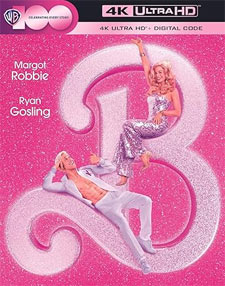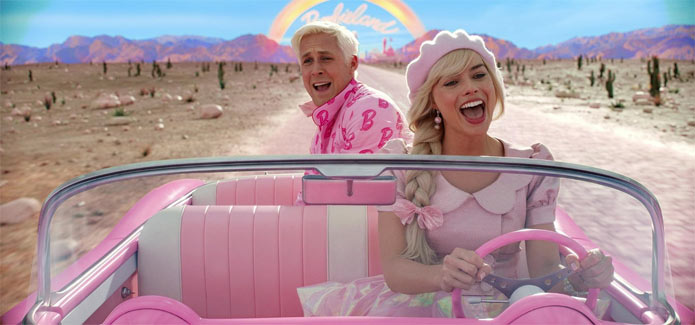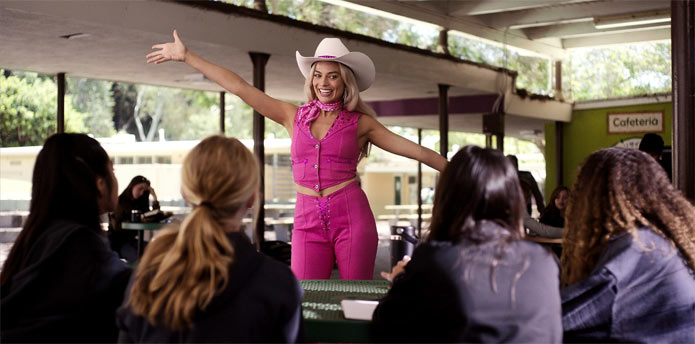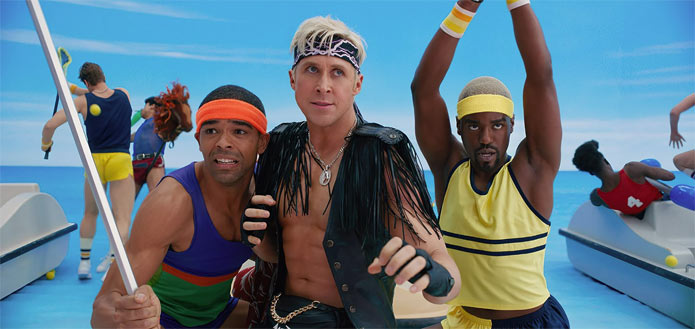
Barbie

 – for suggestive references and brief language.
– for suggestive references and brief language.
Director: Greta Gerwig
Starring: Margot Robbie, Ryan Gosling, America Ferrera, Kate McKinnon, Emma Mackey, Simu Liu, Michael Cera
Running Time: 1 hour, 54 minutes
Theatrical Release Date: July 21, 2023
4K UHD Release Date: October 17, 2023 (Amazon.com)
Plot Summary
Barbie suffers a crisis that leads her to question her world and her existence. (from IMDB.com)
Film Review
It’s been quite the summer 2023 surprise that Greta Gerwig’s live action take on the beloved Mattel toyline for girls, Barbie, has been such a smash at the box office. The movie sold itself as a fun, light-hearted look at the popular dolls, but instead, Gerwig has used it like a trojan horse to get a not-so-subtle message across to audiences. Barbie, the movie, is part delicious escapism and part gender politics propaganda, but the movie never settles completely on one direction. When it’s funny, it’s really funny and quite clever, but when it’s trying to deliver its message of gender inequality, it’s far too heavyhanded and uneven. Sure, I think most of us can agree there is probably a serious image-issue with the plastic perfection that Barbie represents to young girls, but I don’t think it’s quite as mean-spirited and evil as this movie tries to make it seem.

Part of the problem, too, is that Barbie, the movie, tries too hard to make a cultural impact with a toyline that has probably too much history to it. For example, when the movie opens, we’re introduced to “Barbieland,” an adorable world where all of the dolls and their play sets through the years exist in an idealistic, perfect society. You know the one… we saw it already in a lovable movie called The LEGO Movie. That film brilliantly poked fun at the perfection in the lives of the LEGO characters, and Barbie largely feels like it’s attempting the same idea (heck, both movies even star Will Ferrell and are distributed by Warner Bros). Granted, LEGO toys don’t make little girls feel body-conscious, but there’s a similar feel to how these two toy worlds are represented. And, to be fair, this review is being written by an adult male who grew up on G.I. Joe, LEGO, and Transformers – not Barbie; I don’t know what it’s like to grow up with a toyline that gives some girls body-image complexes. (To also be fair, I have grown up with my own fair share of body image issues, but I can’t fault any particular toyline or brand for this issue.) My wife played with Barbie dolls as a little girl and not only wanted to see this movie, but has fond memories of the toys and ended up loving this movie. I am not the target audience here, but I was a little interested in the movie largely because of its two central players – Margot Robbie and Ryan Gosling – and I can say with certainty that they truly are the best parts of this movie.
Margot Robbie takes a lot of weight on her beautiful shoulders for this movie. She’s a stunning young woman and she plays the part of “Stereotypical Barbie” quite well. Robbie gives the character the expected vulnerability and confidence without ever being obnoxious. She stays likeable throughout the film’s runtime. Meanwhile, it seems quite evident that Gosling is having the time of his life playing a version of Ken whose life completely revolves around Robbie’s Barbie. He’s lovably naive — even when he enters the real world and discovers that men generally “rule the world,” compared to women (which is the complete opposite of Barbieland). As soon as Ken discovers this, Gerwig has already started to show her hand to the audience. Robbie’s Barbie is suddenly becoming aware of the dark aspects of life because a girl who used to play with her – for which she also shares a deep bond with – is struggling with depressing thoughts on life. Robbie ventures into the real world with Ken to meet her designated human, and is suddenly met with the cold reality that, in the human world, men cat-call women and have the lead in most of the professions. Ken, who was feeling especially inadequate in Barbieland, suddenly feels empowered, especially when he discovers a little thing called “patriarchy.” The movie then spirals into a Back to the Future II-style world where, when Barbie returns to Barbieland, Ken has brought patriarchy to their world and the men now rule. Barbie soon learns that her fellow Barbies, who are now serving the men gladly, are under some kind of spell that she needs to snap them out of. While the movie is getting slammed by some people for being man-hating, I wouldn’t quite go so far as to dub it that, but it does seem to go out of its way to shame men in any kind of role of “power” or significance. I understand the problems Gerwig is trying to spotlight here, but she’s not only using a little girls toyline to do it, but she’s making Barbieland’s idealistic and “perfect” society out to be a kind of benchmark for what society should be? Again, I acknowledge that there are problems with the roles between the two genders in our society, but I don’t think a Barbie movie is the place to try to make a statement — and I don’t think Gerwig makes her point all that well. In the end, it seems like all she’s concerned about is making sure even the “slowest” viewer will get her message, and not in making a good movie about Barbie.

In fact, the movie seems to be at war with itself. Where The LEGO Movie celebrated the toyline and feels like a feature-film-length toy commercial, encouraging the viewer to fan the flames of their own creativity, Barbie seems to mostly just highlight everything wrong with the toyline, borderline shaming anyone who has had anything to do with it. At one point, tween girls are scolding Robbie’s Barbie for the damage she’s done to womankind, and the next moment, the movie is celebrating the woman who created the toyline in the first place. Pick a lane, Gerwig.
There’s another ironic issue that rears its head in the film regarding gender roles, as well. Doctor Barbie is played quite obviously by a trans man. A male actor has transitioned over the years to a woman and somehow was cast as the iconic “Doctor Barbie” here (over a biological woman, mind you. Think about that for a second). Even sadder is that the character is given more than its fair share of screentime, too. In a movie talking about women’s equality and struggles with beauty, it seems completely backwards, if not misguided (or even twisted — but at the very least, insulting to real women) to have a man who is trying to pass himself off as a woman in real life trying to play a woman in a movie that is so seriously about real women. It makes the efforts of Barbie (the movie) all that more odd and confusing. Hari Nef barely resembles a real woman (his voice is especially distracting), and it makes a scene where Gosling’s Ken compliments Nef on “her” beauty all the more counterfeit and disturbing.
It’s all a shame, too, because Gosling’s performance as Ken is worth the ticket price alone. He’s also given some hilarious dance scenes and dance-off’s that are true highlights in the movie. One could argue that Gerwig just wants all men in the movie to look like a joke, and I’d be tempted to agree with that, as Barbie and her counterparts are mostly represented with serious scenes. Even when Stereotypical Barbie rejects Ken’s affections, he struggles with an identity crisis, desperate to discover who he really is (and it’s played more silly than genuine). Sure, it earns some laughs, but is the message here just a continuous effort to dumb down all men and make them seem inept and useless? I, personally, have no problem with women in powerful roles (and I love Gal Gadot’s Wonder Woman); I don’t feel threatened by women in take-charge roles. But it’s no secret that Hollywood and much of today’s society is actively trying to deconstruct men and their roles in family, authority and the workplace, and a movie like this one does give cause to stop and contemplate this. As Christians, the Bible has very specific roles for men and women, and I think, at the end of the day, the Good Book is where we’re to look for guidance on how our society should best be handling these two gender roles. It seems the most misguided people with the most flawed views on these topics have the loudest voices today, and it’s something we need to be sensitive to.

Since we’re dealing with a movie about a childrens’ toyline, there’s a good reason why this movie is rated PG-13 and not lower. It’s not a kids movie. It’s not even a family movie. (There’s really only one family represented in the movie, and that one is only shown together once in the movie, very briefly. And of course, in the few short moments the husband/father is shown, he seems inept at best.) There is some mild innuendos and language (the worst being a bleeped-out “mother f—–“), but the movie’s themes and tone are surprisingly grim and dark. Because Stereotypical Barbie’s “human” counterpart is in despair, we see Barbie in Barbieland suddenly being self-aware and contemplating death. It disturbs her perfect society and brings up all kinds of serious topics like mortality, growing old, career, discontentment, troubles in parenthood, and purpose. Barbie even gives up at one point, feeling as if she has no real purpose in life. Yeah, it’s kind of a downer. At the same time, Gerwig leans on the Ken characters for humor to lighten the mood a bit, and those really are the movie’s best moments.
I’m still kind of surprised by Barbie‘s success at the box office. I’m not sure if it’s mostly curiosity that’s filling the theater seats, or if it’s actually that big of a hit with audiences. But one thing’s for sure — if you do decide to watch Barbie, there’s a good chance you’re in for a much different viewing experience than what you might be expecting.
– John DiBiase (reviewed: 8/21/23)
4K UHD Special Features Review
The 4K UHD release of Barbie includes the feature film in 4K UHD and bonus features on disc, along with a Movies Anywhere digital copy. (There is not Blu-Ray disc packaged with the 4K disc.)
Barbie in 4K UHD – Content and story aside, the movie looks beautiful in 4K. It’s a very colorful movie, so the UHD presentation is gorgeous and really pops! When Barbie and Ken venture to the real world, it’s definitely less lovely to look at, but the clarity is certainly still there. Everything in Barbie Land is just so colorful and crisp. I have to say I do recommend this 4K presentation.
Now, on to the Extras. The bonus features are shockingly light for 2023’s biggest box office hit. We get six featurettes, with the longest being 12 minutes long, but there are no deleted scenes, bloopers (I imagine those would have been pretty fun from this movie) and no really deep discussions about the themes of the movie. If anything, these featurettes add up to more of a celebration of the Barbie toy legacy and the actual making of the movie itself.
It’s a Weird World (5:04) – The first featurette is about the “weird” Barbie, played by Kate McKinnon, and all the mutilated Barbie dolls that little girls have messed with through the years. Director Greta Gerwig talks about the character and how she has actually known Kate since they were both teenagers!
All-Star Barbie Party (4:58) is basically a rundown of the cast featured in the film — from Margot Robbie and Ryan Gosling, right on down the line. (I still find Doctor Barbie being played by a man super distracting. It seems completely ironic that it was a great achievement for women when they were allowed to become doctors, and here a man is playing a woman doctor. It’s just so bizarre.)
Music Make-Believe (9:12) – Gerwig talks about how she approached the musical numbers as if they were the old soundstage musicals of classic Hollywood. It focuses on the music itself, the dances, the dream ballet, and the beach fight among the Ken characters. (1 “Oh my G-d”)
Becoming Barbie (6:29) is about the designing of the live action character, and transforming Margot into “stereotypical” Barbie. They detail her different outfits and wigs throughout the film.
Welcome to Barbie Land (12:01) – Barbie Land is described as “authentically artificial,” and utilized many detailed practical sets to bring it to life. They treated the Barbie Land sets as a giant toy box. They discuss designing the Land to represent actual play sets – including things having decals or being smaller than the dolls so they match the toy scaling, etc. The “Weird Barbie” house is then covered, followed by when Barbie Land is turned into Ken’s world, with all the featured masculine accessories. Finally, we get to see how they did the fun travel montage sequence and the cool sets they created for those short moments.
Playing Dress Up: An Extended Look at the Costumes of Barbie (7:26) – And lastly, we have a short documentary about the costumes featured in the Barbie film and how they’re made to honor real Barbie doll costumes from through the decades.
– John DiBiase, (reviewed: 10/18/23)
Parental Guide: Content Summary
![]() Sex/Nudity: The Ken’s say several times that they’re going to “beach” each other off (which sounds like a double entendre); Weird Barbie makes a comment that she’d like to see Ken’s “blob” (since he doesn’t have genitals); In the real world, a group of male construction workers cat-call Barbie and flirt with her (one says something like “If I told you you had a nice body, would you hold it against me?” In response, Barbie tells them they neither she or Ken have “genitals”; At the end of the film, Barbie goes to see a doctor’s office and joyfully tells the receptionist she’s there to see the gynecologist; Gosling’s Ken is seen without a shirt or with his shirt open for most of the movie. Other Ken’s are also shown without shirts; A man slaps Barbie’s butt just off screen. She then punches him in the face; A couple references are made to how awkward it is that there is a pregnant Barbie; We see some rejected Barbie dolls, including a Skipper whose chest size suddenly grows; Doctor Barbie is quite obviously a trans man. The character is shown prominently in many scenes throughout the movie as if they were an actual woman.
Sex/Nudity: The Ken’s say several times that they’re going to “beach” each other off (which sounds like a double entendre); Weird Barbie makes a comment that she’d like to see Ken’s “blob” (since he doesn’t have genitals); In the real world, a group of male construction workers cat-call Barbie and flirt with her (one says something like “If I told you you had a nice body, would you hold it against me?” In response, Barbie tells them they neither she or Ken have “genitals”; At the end of the film, Barbie goes to see a doctor’s office and joyfully tells the receptionist she’s there to see the gynecologist; Gosling’s Ken is seen without a shirt or with his shirt open for most of the movie. Other Ken’s are also shown without shirts; A man slaps Barbie’s butt just off screen. She then punches him in the face; A couple references are made to how awkward it is that there is a pregnant Barbie; We see some rejected Barbie dolls, including a Skipper whose chest size suddenly grows; Doctor Barbie is quite obviously a trans man. The character is shown prominently in many scenes throughout the movie as if they were an actual woman.
![]() Vulgarity/Language: 1 bleeped “mother *******”; 1 “For Chr*st’s sake,” 1 “d*mn,” 3 “Oh my G-d,” 1 “G-d,” 1 “cr*p”; The song in the credits uses “b*tch” at least twice and what sounded like the “S” word at least once.
Vulgarity/Language: 1 bleeped “mother *******”; 1 “For Chr*st’s sake,” 1 “d*mn,” 3 “Oh my G-d,” 1 “G-d,” 1 “cr*p”; The song in the credits uses “b*tch” at least twice and what sounded like the “S” word at least once.
![]() Alcohol/Drugs: Ken talks about drinking beer and having coolers and mini-fridges with beer in them.
Alcohol/Drugs: Ken talks about drinking beer and having coolers and mini-fridges with beer in them.
![]() Blood/Gore: None.
Blood/Gore: None.
![]() Violence: A man slaps Barbie’s butt just off screen. She then punches him in the face; Ken crashes his surfboard into a non-moving plastic wave. He acts injured and goes to see the doctor and ends up being fine; A large brawl breaks out involving the Ken’s and some makeshift weapons, but nothing overtly violent. No one gets hurt either; Allan fights some of the Ken’s; Most of the violence is slapstick and meant to be silly.
Violence: A man slaps Barbie’s butt just off screen. She then punches him in the face; Ken crashes his surfboard into a non-moving plastic wave. He acts injured and goes to see the doctor and ends up being fine; A large brawl breaks out involving the Ken’s and some makeshift weapons, but nothing overtly violent. No one gets hurt either; Allan fights some of the Ken’s; Most of the violence is slapstick and meant to be silly.
